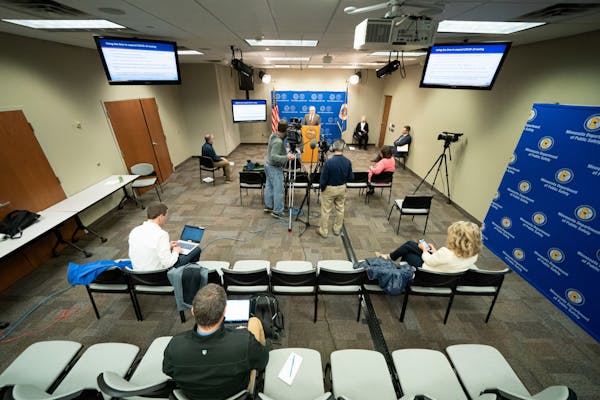DULUTH – Essentia Health surgeon Dr. Mark Scott was skeptical of the hospital's plan to decontaminate and reuse the all-important N95 masks that are in short supply nationwide.
"I initially had quite a bit of concern after reading some of the concerns raised by 3M," which recommends against any reuse of its masks, he said. "The fact is this has been studied, and we've shown after treatment the masks can still pass a fit test. That gave me a lot more confidence."
Already more than 300 masks have been decontaminated for reuse at St. Mary's Medical Center in Duluth, with dozens more sent into a room to be sterilized by UV light every day.
By decontaminating the single-use masks while there is a shortage, Essentia has quintupled its supply to ensure health care workers have the protection they need before an expected surge of COVID-19 patients hits Northeastern Minnesota. Of the state's confirmed coronavirus cases, more than 25% are health care workers.
Essentia is using the same method the University of Nebraska Medical Center implemented last month that is starting to find use in hospitals around the country. Masks that can be reused are hung from clotheslines in a small room and bathed in UV light that is reflected off the walls, almost like a large-scale tanning bed.
"We're making sure we have a mask that has good integrity for our staff," said Carly Mathews, sterile processing manager at Essentia.
While the Nebraska method was effective for up to a dozen reuses "without any adverse effects to the masks," Mathews said, Essentia decided to limit their process to five times per mask as a "middle ground we're more comfortable with."
The leading manufacturer of the N95, Maplewood-based 3M, has said it "does not recommend or support attempts to sanitize, disinfect, or sterilize" its masks but said it is working with other companies and experts to find a method it can back.
The Centers for Disease Control and Prevention is allowing hospitals to make their own decisions on sterilizing masks as needed.
"We understand in times of crisis, this option may need to be considered when (mask) shortages exist," the CDC's guidance says.
Mathews said her team in Duluth picks up about 20 masks at a time three times a day, usually at the end of nurse shifts. The UV process is also in use at Essentia facilities in Fargo and Brainerd.
Scott said the dosage of UV light is more than enough to kill viral particles but not enough to deteriorate the filter material or affect the fit.
"If the supply chain issue is resolved, we would certainly go back to single-use," he said, adding he's "frustrated to read about the lack of any concerted federal response to this."
For now, Scott said, the reuse plan is a necessary one.
"Taking these steps to avoid infection will avoid having people sidelined or even killed by this."
Brooks Johnson • 218-491-6496

'Safe recovery sites' would offer syringes, naloxone and more to people using drugs. The plan could be in peril.
New Minnesota GOP leaders seek peace with party's anti-establishment wing

Who is Republican Lisa Demuth, Minnesota's first House speaker of color?

